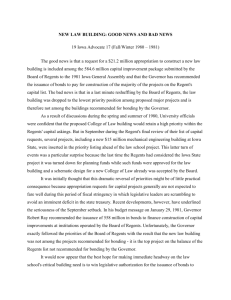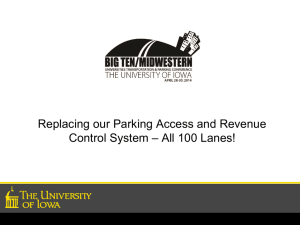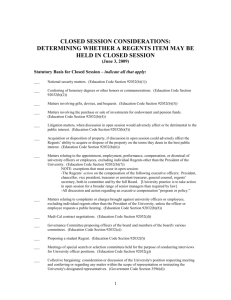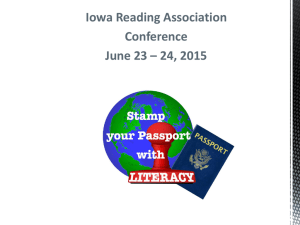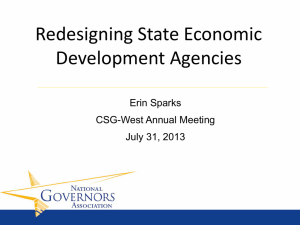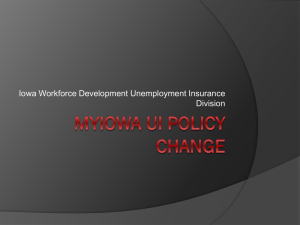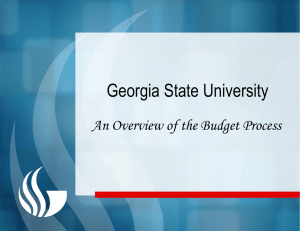Leadership & Governance: Burning Question at U. of Iowa: Who
advertisement
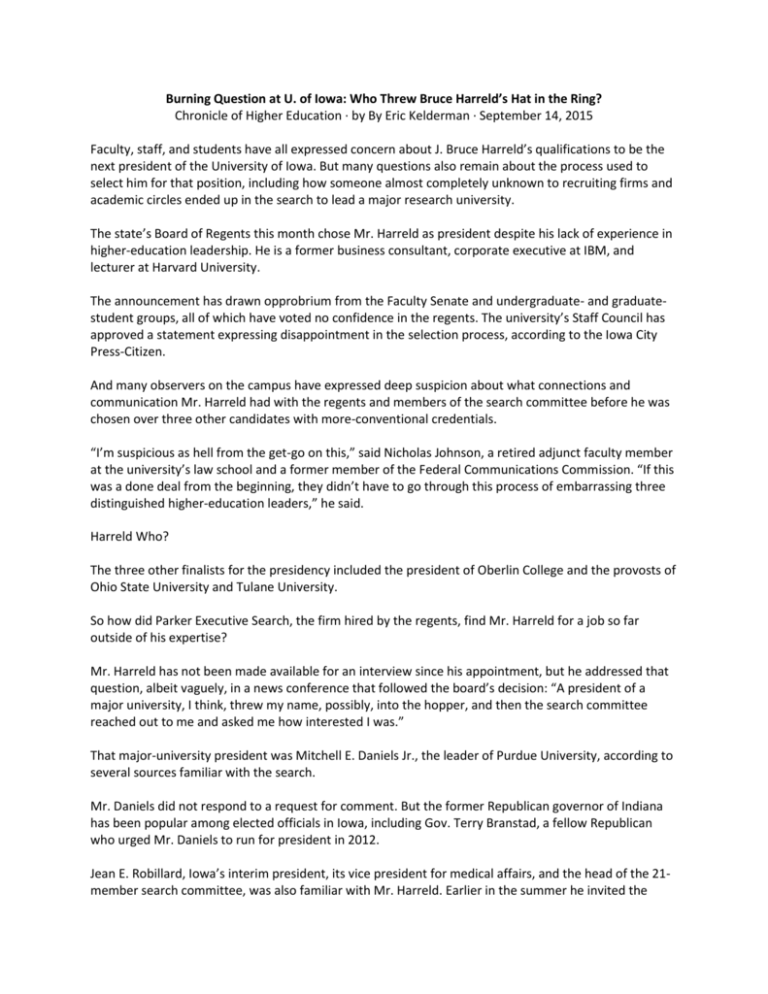
Burning Question at U. of Iowa: Who Threw Bruce Harreld’s Hat in the Ring? Chronicle of Higher Education · by By Eric Kelderman · September 14, 2015 Faculty, staff, and students have all expressed concern about J. Bruce Harreld’s qualifications to be the next president of the University of Iowa. But many questions also remain about the process used to select him for that position, including how someone almost completely unknown to recruiting firms and academic circles ended up in the search to lead a major research university. The state’s Board of Regents this month chose Mr. Harreld as president despite his lack of experience in higher-education leadership. He is a former business consultant, corporate executive at IBM, and lecturer at Harvard University. The announcement has drawn opprobrium from the Faculty Senate and undergraduate- and graduatestudent groups, all of which have voted no confidence in the regents. The university’s Staff Council has approved a statement expressing disappointment in the selection process, according to the Iowa City Press-Citizen. And many observers on the campus have expressed deep suspicion about what connections and communication Mr. Harreld had with the regents and members of the search committee before he was chosen over three other candidates with more-conventional credentials. “I’m suspicious as hell from the get-go on this,” said Nicholas Johnson, a retired adjunct faculty member at the university’s law school and a former member of the Federal Communications Commission. “If this was a done deal from the beginning, they didn’t have to go through this process of embarrassing three distinguished higher-education leaders,” he said. Harreld Who? The three other finalists for the presidency included the president of Oberlin College and the provosts of Ohio State University and Tulane University. So how did Parker Executive Search, the firm hired by the regents, find Mr. Harreld for a job so far outside of his expertise? Mr. Harreld has not been made available for an interview since his appointment, but he addressed that question, albeit vaguely, in a news conference that followed the board’s decision: “A president of a major university, I think, threw my name, possibly, into the hopper, and then the search committee reached out to me and asked me how interested I was.” That major-university president was Mitchell E. Daniels Jr., the leader of Purdue University, according to several sources familiar with the search. Mr. Daniels did not respond to a request for comment. But the former Republican governor of Indiana has been popular among elected officials in Iowa, including Gov. Terry Branstad, a fellow Republican who urged Mr. Daniels to run for president in 2012. Jean E. Robillard, Iowa’s interim president, its vice president for medical affairs, and the head of the 21member search committee, was also familiar with Mr. Harreld. Earlier in the summer he invited the Eric Kelderman – Chronicle – Burning Question – 150914 - Page 2 of 3 businessman to speak with some senior staff members at University of Iowa Health Care. Dr. Robillard did not recall how he had first heard of Mr. Harreld, but he brought him to the campus early in July to offer perspectives on improving health-service operations. “We were looking for a different speaker — not a consultant — to come and tell us about what they did in a different enterprise, what they did to keep them at the top,” Dr. Robillard said. “When I heard his name, I said, This is the type of person that really I need to bring to give us a talk.” Dr. Robillard stressed that Mr. Harreld was not a candidate to be Iowa’s president at that time. There were other visitors, he said, who were recruited to apply after similar speaking engagements on the campus. “We are a university,” he said. “We are dealing with different people all across the country, and it’s not unusual to have people who come to campus.” The search’s application deadline was July 31. After that, the search committee narrowed the field of nearly 50 applicants to a group of nine who were interviewed in Chicago on August 11 and 12. Christina Bohannan, president of the Faculty Senate and a member of the search committee, said all its members had been encouraged to recruit potential candidates. “I forwarded a number of names, especially women’s names, in the interest of diversity, and talked to a lot of people about who I thought should be a candidate,” she said. A Tainted Process? How Mr. Harreld ended up as a finalist for the job is largely a mystery because the search committee deliberated in a closed session. But sources familiar with those discussions said that at least one other candidate among the nine interviewees also had minimal experience in higher-education leadership. Mr. Harreld was not a unanimous choice to be among the four finalists, the sources said. Many other questions about the process have arisen. One surrounds an August phone call between Mr. Harreld and Governor Branstad that was arranged by Bruce L. Rastetter, president of the Board of Regents and one of three regents who served on the search committee. Mr. Rastetter has been a generous campaign contributor to the governor and is often called a kingmaker in the state’s politics. No such phone call was arranged for the other finalists, according to the Associated Press. Dr. Robillard said he didn’t understand why the call had happened. But he did not feel it had tainted the process, he said, because the other members of the search committee were unaware of Mr. Harreld’s talk with the five-term governor. “I don’t know why they did that,” he said. “You should ask Bruce Rastetter about this.” Mr. Rastetter, who has often openly criticized the university and its former president, Sally K. Mason, declined a request for an interview. A spokesman for the board explained in an email that “Mr. Harreld was interested to know about the governor’s support for the university if he continued through the process, became a finalist, and Eric Kelderman – Chronicle – Burning Question – 150914 - Page 3 of 3 ultimately be selected as president. Regent Rastetter made the inquiry to the governor’s office, and the governor called Mr. Harreld to tell him that he would support the University of Iowa no matter who the successful candidate was.” For Ms. Bohannan and others, the problem with the search occurred not during the recruitment process or selection of finalists, but when the regents ignored the overwhelmingly negative feedback from students and faculty members to Mr. Harreld. The day before the regents voted, Ms. Bohannan sent an email warning them of the potential fallout should they choose the business leader. A poll of faculty members found that less than 3 percent thought he was qualified for the position. At an open forum two days before he was picked as president, Mr. Harreld faced a crowd of critics who questioned everything from his business background to inaccuracies on his résumé. “We were absolutely promised by Regent Rastetter that faculty, student, and staff voices would be considered, and that clearly didn’t happen,” Ms. Bohannan said. That has made everyone suspicious of the process, she added. “It just sounds like it was a closed process dressed up like an open process. It disrespects shared governance and makes us all look complicit in this,” she said. “We were in there fighting for our constituents. All of the hours of this were just absolutely wasted.” Eric Kelderman writes about money and accountability in higher education, including such areas as state policy, accreditation, and legal affairs. You can find him on Twitter @etkeld, or email him at eric.kelderman@chronicle.com. Chronicle of Higher Education · by By Eric Kelderman · September 14, 2015
